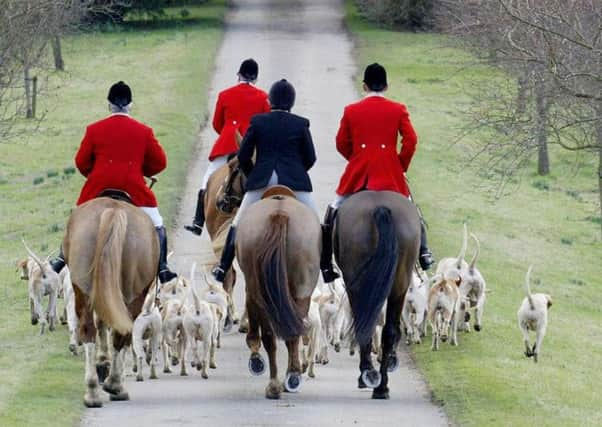Exclusive: Fewer than two huntsmen a year guilty of breaking ban


Latest Ministry of Justice figures show that 21 people involved with hunts have been found guilty under the Hunting Act 2004.
The Act, which triggered waves of protests from animal welfare and opposing countryside groups in the run up to the law’s inception, bans the hunting of wild mammals with dogs in England and Wales. Come Wednesday, the legislation, hailed both a success and, conversely, deeply flawed by opposing sides, will have been law for ten years.
Advertisement
Hide AdAdvertisement
Hide AdThe ban has cast a shadow over the lives of some huntsmen who talk of the fear of being the target of “spurious” accusations whenever they ride out, with anti-hunting groups having spent vast sums of money to mobilise professional activists to gather evidence of law-breaking.
But the anti-hunting lobby says the ban has been effective with more than 500 prosecutions brought under the Act between 2005 and 2013. Pro-hunting groups point to only a fraction of those prosecutions having involved registered hunts - the red coat-wearing ‘poster boys’ of the anti-hunting campaign.
In the same period, just 52 people associated with hunts registered with the Council of Hunting Associations have been prosecuted against - and 21 individuals have been found guilty.
Four cases involving multiple defendants have been brought in that time in Yorkshire. Of those, three people have been found guilty; two others were found not guilty; it was ruled that six others had no case to answer and one other individual was given a conditional discharge.
Advertisement
Hide AdAdvertisement
Hide AdOverall, the Act has seen 526 people prosecuted, with 341 found guilty. The majority of the total offences involved illegal poaching and not organised hunts.
Tim Bonner, the organisation’s director of campaigns, said: “There are probably 300 registered hunts across the UK and in ten years there has not been more than a handful of prosecutions. Where there have been allegations they have been made almost exclusively by professional animal activists and what it says is that this is still a large amount of taxpayers’ money wasted on the investigation and prosecution of cases, most of which fail and even if they don’t fail there is no evidence that there is any benefit to animal welfare.
“There have been a lot of prosecutions under the Act but well over 95 per cent of these cases have nothing to do with hunts. It’s to do with casual hunting and poaching in many cases and these offences could have been prosecuted under existing legislation.
“The first step has to be to scrap the Act. We don’t think it’s possible to amend it into anything that’s sound or sensible but we are open to discussion about actions that improve animal welfare.”
Advertisement
Hide AdAdvertisement
Hide AdThe League Against Cruel Sports is campaigned hard to bring the Act to bear.
Michael Stephenson, the lobby group’s director of campaigns, said: “Ten years on, the Hunting Act is the most successful piece of wild animal welfare legislation, with a higher number of convictions than similar wildlife laws. The problem is not with the law. It’s with those that flout it. It is time to now build on the successes of the first ten years and strengthen the Hunting Act to ensure the spirit of the Act is fulfilled. A criminal is a criminal; whether they wear a red coat or belong to a club is irrelevant.
“The Hunting Act was brought in to stop cruelty to animals in the name of sport, regardless of the perpetrator.
“Changes to the Act are needed to ensure that all illegal hunters - casual, registered or otherwise - are brought to justice.”
Advertisement
Hide AdAdvertisement
Hide AdThe League wants sentencing powers under the Act to be increased with a new maximum penalty of six months imprisonment, the use of dogs below ground to flush out wild animals to be prohibited and it wants to see a ‘reckless’ provision to be inserted to stop hunters using trail hunting as a “false alibi”.
Despite early fears, the Act has not led to a collapse of the hunting scene. The current law in England excludes the use of dogs to flush out an unidentified wild mammal, and drag hunting, where hounds are trained to follow an artificial scent, and the Countryside Alliance reports that an estimated 250,000 people still gather across the country to take part in the annual Boxing Day hunts.
Nonetheless, the pro-hunting lobby wants the Act to be repealed.
Tim Easby has been a member of two local hunts, the Middleton and the West of Yore in North Yorkshire, and is now director of the Master of Foxhounds Association. The Hunting Act was a result of “class warfare” and was not motivated by political will to improve animal welfare, he claimed.
Advertisement
Hide AdAdvertisement
Hide Ad“Hunting is not what it was but I suppose it’s like anything, if you try to ban something it becomes more popular. More people are hunting now than before the ban because of the classic British thing - we don’t like being told what to do. “The sadness is this was about class warfare rather than animal welfare. It hasn’t done anything to protect the fox. Whether you like hunting or you don’t, the result was a certain death. It was a natural process which is reflected in the wild all the time.
“The spirit and determination of the hunt knits the rural community together and it’s hard to explain that to some politicians. The spirit to keep going is something that I haven’t seen before - I’m amazed and surprised by it.”
READ MORE...